

Let’s start with a whopping stat, shall we? 👀
The Business Process Management (BPM) market is predicted to reach 14.4 billion U.S. dollars by 2025. It’s clear that more and more businesses are choosing to use BPM software to drive efficiency and make better decisions.
Forward-thinking companies use various tools to increase revenue, simplify operations, and generally make their workplaces run like profitable well-oiled machines.
From project management software and event planning software to task management, the choices are endless.
In this article, we’ll take a deep dive into the world of business process management, explore six of the best BPM tools, their key features, and how you can find the best-fit business process automation software for your unique organization.
Before we get into all of that, let’s define exactly what BPM is.
What is Business Process Management?
Business process management is creating, analyzing, monitoring, and transforming core business processes. In brief, BPM identifies a business’s opportunities, successes, and problems through the ongoing monitoring of processes.
Business processes keep a company moving in the right direction and enable teams to do their job and track progress more efficiently.
The applications are wide-ranging and vary from company to company, but some common examples of how an effective BPM can be used are:
- Onboarding new employees: BPM can automate parts of the onboarding process, reducing the time spent completing documents. It also helps provide a smoother transition as an organization’s processes and policies are clearly documented, leading to an easier handover.
- Content marketing: BPM software can help a company develop efficient, easy-to-follow workflows for content marketing that incorporates writing, editing, optimizing, and publishing. It can also help manage existing content and the scheduling and creation of new content to enable companies to meet their marketing goals.
- Purchase orders: Process management can help streamline the creation and processing of purchase orders. They provide transparency and accountability to reduce errors and ensure that deadlines are met.
Want to dive deeper into what business process management is? This informative article on BPM explains it in-depth, as well as the stages involved in BPM.
What Are the 3 Types of BPM?
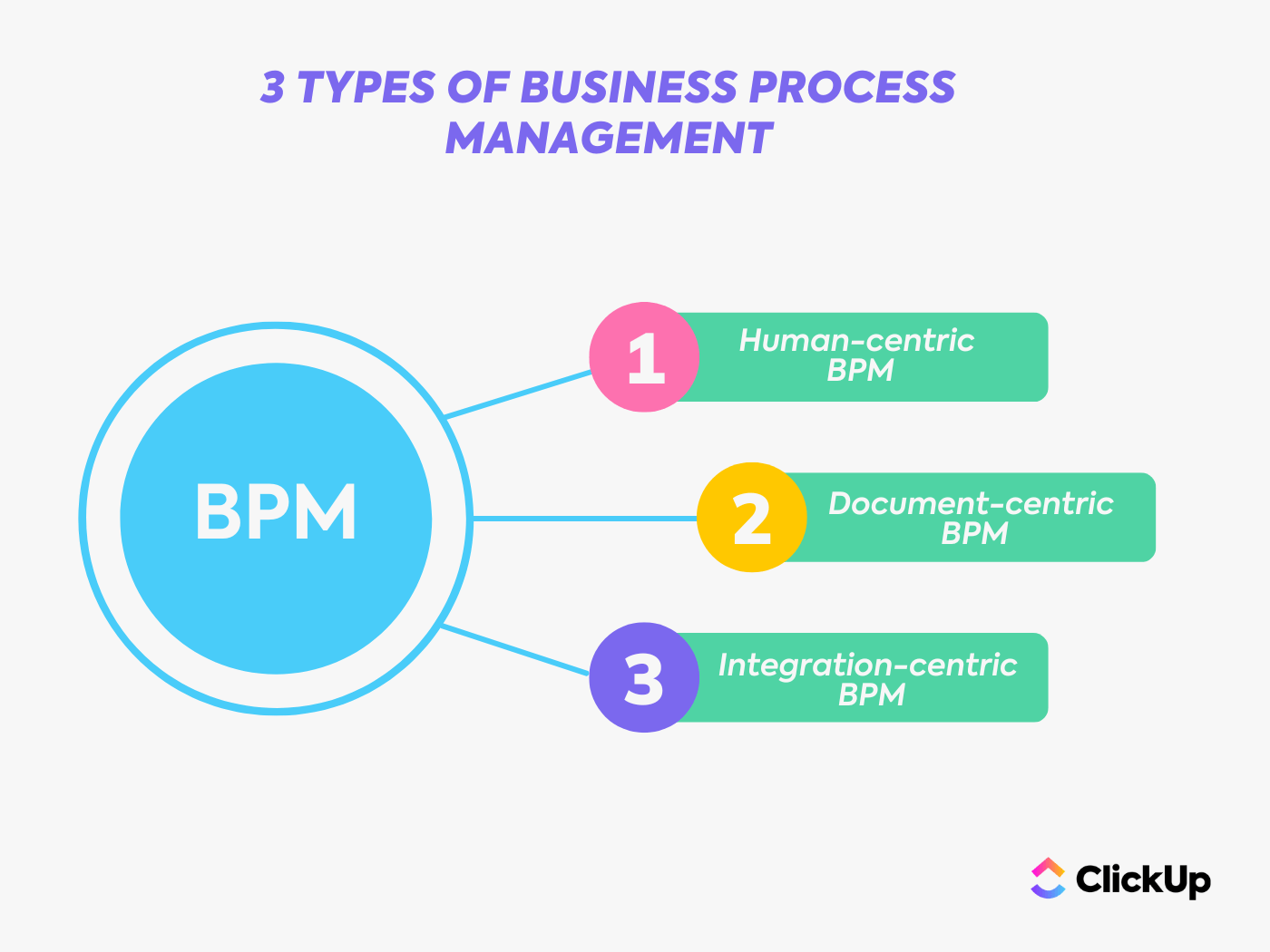
There are three main types of business process management:
1. Human-centric BPM
As the name suggests, this type of BPM is used for processes carried out by humans and usually requires staff approvals. Human-centric BPM involves simple tracking and notifications in an intuitive dashboard.
2. Document-centric BPM
Document-centric BPM is when a document is at the core of the process. This type of BPM enables processes like formatting, verification, project management, document management, and receiving document signatures.
3. Integration-centric BPM
Integration-centric BPM is used between existing software systems—these can be CRM and ERP systems. Typically, this type of BPM is used with minimal human intervention, as such systems have API access to make processes run faster.
What is Business Process Management Software?
BPM software analyzes, monitors, and transforms business processes.
Business process management software typically has features that provide workflow automation, advanced reporting, collaboration tools, and integration capabilities.
What are BPM tools used for?
Businesses use BPM tools for:
- Reviewing and analyzing overall processes
- Aligning business functions with customer needs
- Monitoring and measuring business resources
- Optimizing business processes
- Checking costs to make daily operations and essential processes cost-effective
Want an example? Sure!
Using BPM systems might alert you that repetitive tasks are causing excessive manual work for your employees. Or perhaps a business’s proposal documents aren’t closing sales quickly enough, even with email marketing templates.
Once a problem has been identified, businesses can work on it until it has been fully resolved.
What makes a good BPM tool?
When choosing your BPM tool, there are some of the more important features to look out for:
- Customizable: An effective BPM should be easily customizable so that you can adapt it to your changing business needs
- Integrations: Your BPM needs to integrate with all existing software your company uses. Make sure to choose one that offers a range of integrations
- Easy to use: You don’t want to constantly rely on your IT team for changes and the creation of new workflows. Look for software that provides templates and drag-and-drop features and doesn’t require coding knowledge
- Reporting tools: To measure how efficient your process management is, you need efficient reporting capabilities
- Collaboration: Much like enterprise businesses choose IP phone systems to stay connected on the go, your business process management system should have Desktop, iOS, and Android interconnectivity options for easy collaboration
- Support: When investing in a BPM tool, ensure that it comes with comprehensive support so you can deal with any issues quickly and efficiently
There are plenty more features to look for, the important thing is to identify your company’s needs and what you want to achieve with a BPM tool.
6 of the Best Business Process Management Software in 2024
1. ClickUp
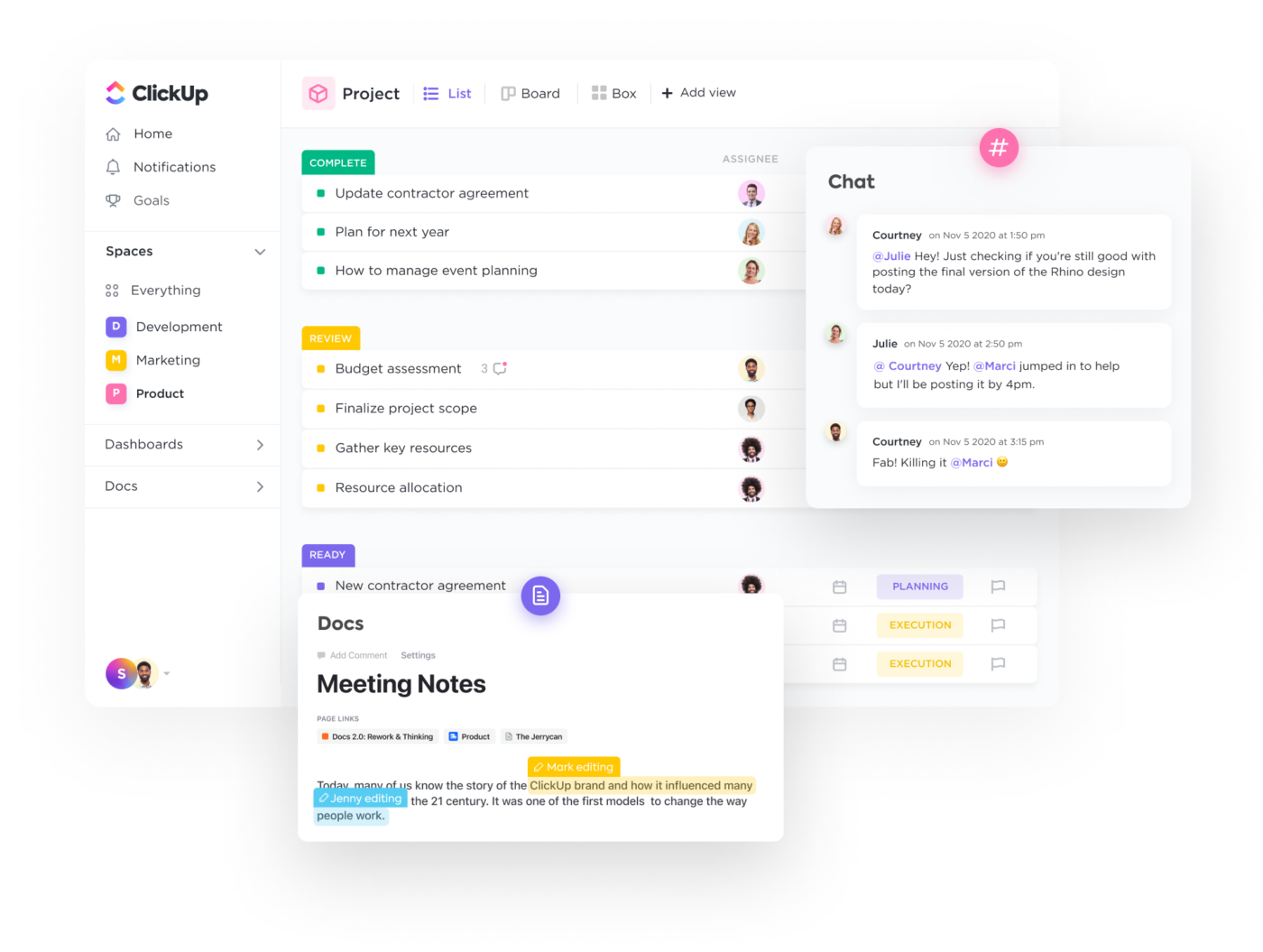
Let’s start this round-up of the best business process management software with ClickUp—an all-in-one-project management tool built for teams of all sizes across industries.
It offers a fully customizable platform that gives teams and any business the advanced tools and the flexibility they need to create the most efficient workflows that best suit their business and project needs, as well as their workflow preferences.
As for creating effective business process management systems, ClickUp’s tools can help businesses:
- Automate workflows: Optimize your processes and reduce manual work with predefined and custom automation
- Support team collaboration: Enhance team communication and collaboration with a built-in chat feature, ClickUp Whiteboards for processes planning, ClickUp Docs for knowledgebase and SOPs, and so much more
- Get access to real-time reporting: Create custom Dashboards to allow you to see your operations and a high-level overview of your work at a glance
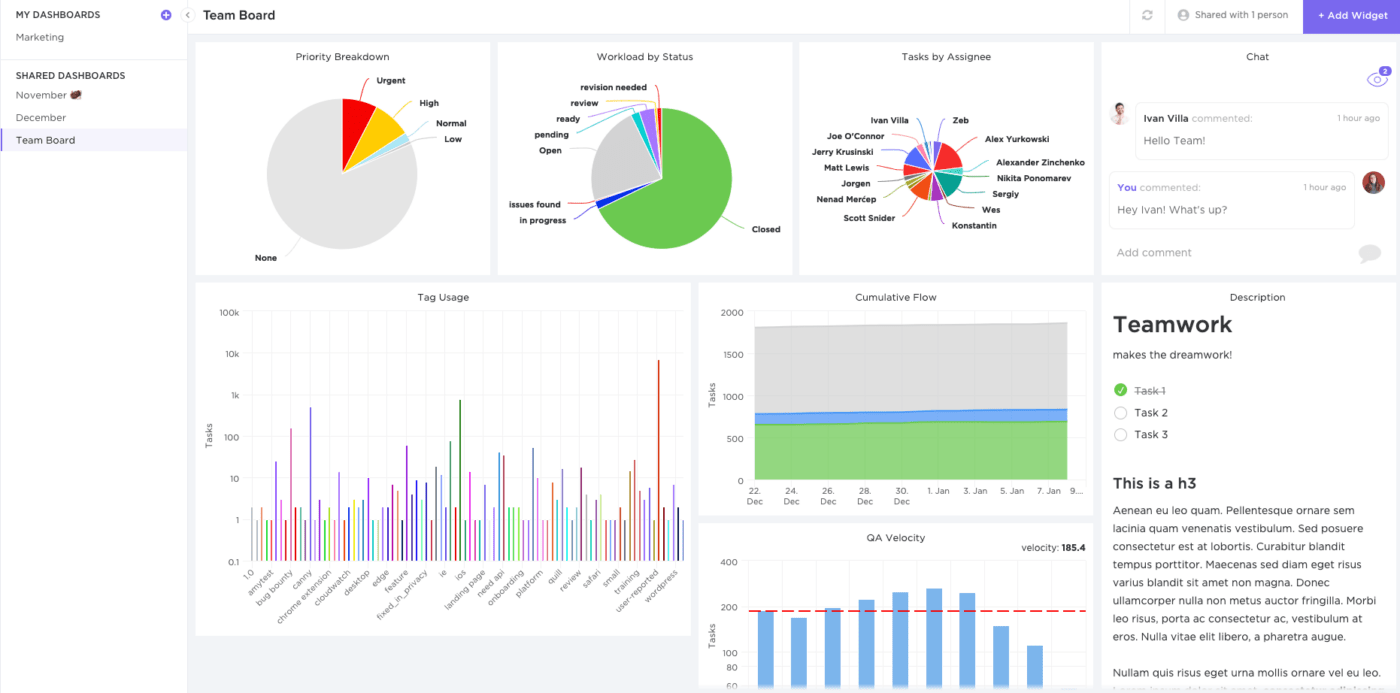
On top of it all, ClickUp offers pre-built and customizable templates. Get access to a library of templates for all use cases, including a Process and Procedures Template by ClickUp to help you plan and execute effective business process management systems.
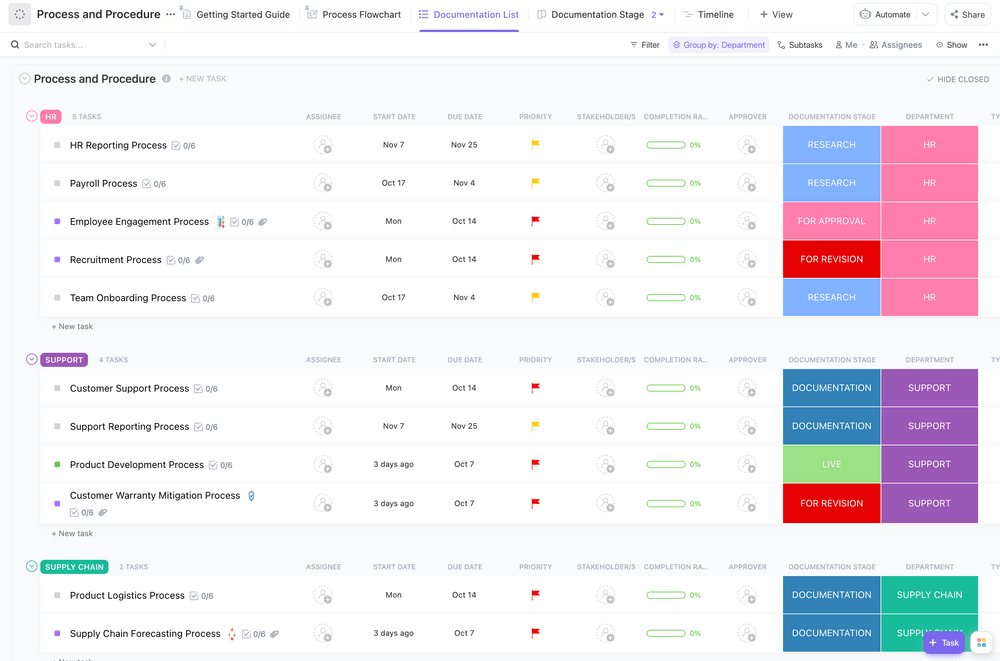
Key features
- 15+ Custom views: Choose from 15 ways to view your work (Gantt, Board, Box view, and more)
- Digital Whiteboards: Map out your strategies and processes in ClickUp Whiteboards and connect them to your work
- Collaborative Docs: Create knowledgebase, wikis, SOPs, and more and share them with your team
- Custom Fields and Custom Status: Add as many Custom Fields as needed to give your team and stakeholders the context they need to get on the same page and create Custom Statuses to help with progress tracking
- Custom Dashboard: Choose from 50+ widgets and build your ideal dashboard to get real-time reporting and analytics of your work
- Workflow automation: Custom automation to streamline your workflows and keep processes consistent
- Powerful integration capabilities: Connect ClickUp to over 1,000 work tools
- Mobile app: Take ClickUp on the go and access it from anywhere
Pros
- Drag and drop functionality
- Feature-rich free plan
- Fully customizable platform
- Collaborative tools
- Real-time reporting
Limitations
- Learning curve due to the number of available features
- No Table view in the mobile app yet
Pricing
- Free Forever: Feature-rich free plan
- Unlimited: $7/month per user
- Business: $12/month per user
- Enterprise: Contact for pricing
Customer ratings and reviews
- G2: 4.7 out of 5 (2,000+ reviews)
- Capterra: 4.7 out of 5 (3,519+ reviews)
2. Process Street
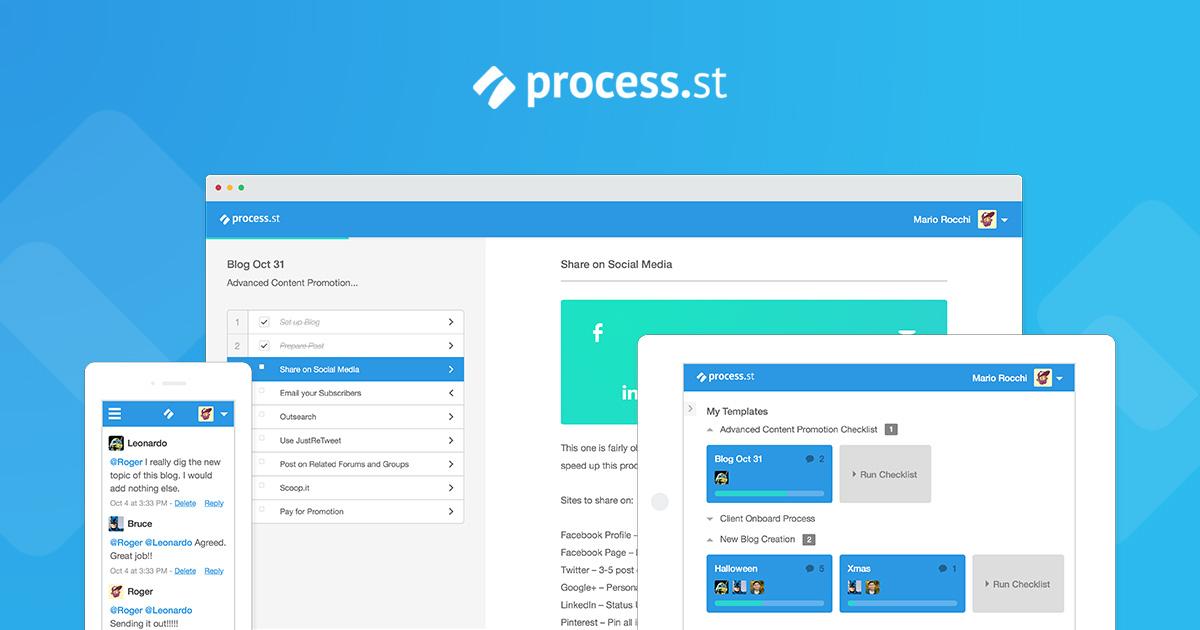
Process Street helps businesses improve project management and handle small projects with multiple business users.
Its BPM software offering includes generating procedural documents with simple keyboard shortcuts via a drag-and-drop interface.
Use this business process management system to create workflows, carry out processes, and distribute them to your wider teams.
Key features
- No code interface
- Conditional logic
- Single-instance, multi-stage, and sequential approvals
- Task assignment
- Over 3000 integrations
- Email and chat support
Pros
- Multiple templates
- Easy to record and track processes
- Dashboard oversights to track real-time activity
- Simple and alterable checklists
Limitations
- Editing templates is tricky for non-technical users
- No advanced reporting tools
- Complex conditional programming
Pricing
- Startup: $100/month
- Pro: $415/month
- Enterprise: $1,660/month
Customer ratings and reviews
- G2: 4.6 out of 5 (344+ reviews)
- Capterra: 4.7 (571+ reviews)
3. Kissflow
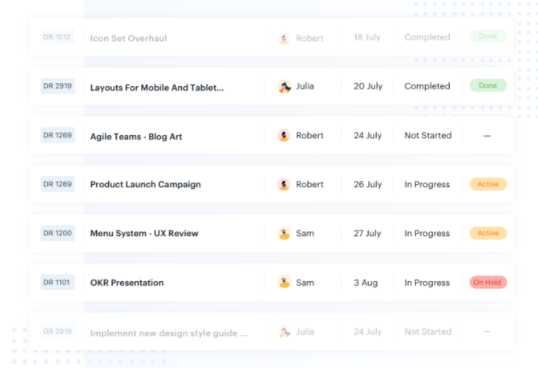
As a business process management software solution, Kissflow is suitable for businesses of all sizes. This workflow management software supports BPM and performance monitoring by standardizing processes and automating notifications, assignments, and escalations.
Kissflow’s cloud-based business process management system helps businesses streamline and simplify workflows and automate processes. So far, so good. As a platform, because of its low-code tools, there is less flexibility in addressing more complex situations and workflows.
Key features
- Visual process design for seamless business process reengineering
- Dynamic routing
- Code-free workflow forms
- Document sharing and social collaboration
- SLA manager
Pros
- Creates process workflows without coding
- Offers customizable process reports
- Assigns users to any step of the business process
- Links workflows with third-party tools
Limitations
- Tricky to onboard a non-technical user
- Pricy pricing plans
- No ability to simply assign tasks to multiple users
Pricing
- Small Business: $15 per user/month
- Corporate: $20 per user/month
- Enterprise: Contact for pricing
Customer ratings and reviews
- G2: 4.5 out of 5 (501+ reviews)
- Capterra: 3.9 out of 5 (36+ reviews)
Check out these Kissflow alternatives!
4. Smartsheet
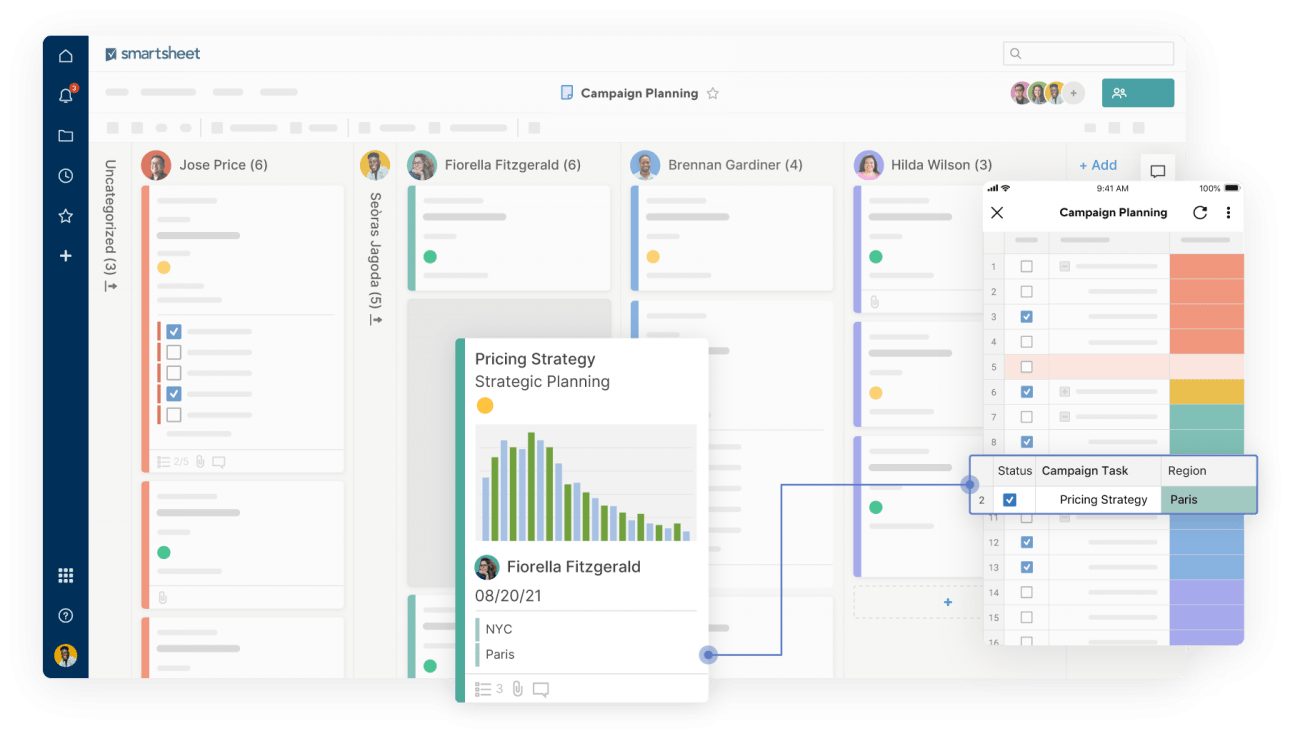
Smartsheet offers a spreadsheet-based BPM tool to help businesses plan, manage, and track projects. 📊
Much like you’d implement a small business VoIP system to improve business collaborations, Smartsheet is also a tool that excels at collaboration.
Dashboards, sheets, and reports all integrate seamlessly. The ideal use case for Smartsheet is for businesses with tech-savvy staff who can easily pick up the necessary formulas to navigate the sheets.
Key features
- Workflow automation
- Secure request management
- E-signatures for documents
- Customer-managed encryption keys
- Activity log
Pros
- Simple and automated workflows to replace manual and repetitive processes
- Different permission levels for viewing, editing, and administrating tasks
- Sheet templates for common business problems
- Gantt views of milestones and project dependencies
Limitations
- No built-in time-tracking function
- Spreadsheets are not an intuitive method of managing business processes
Pricing
- Pro: $7 per user/month, billed annually
- Business: $25 per user/month, billed annually
- Enterprise: Contact for pricing
Customer ratings and reviews
- G2: 4.4 out of 5 (9,201 reviews)
- Capterra: 4.2 (2,658+ reviews)
5. Appian
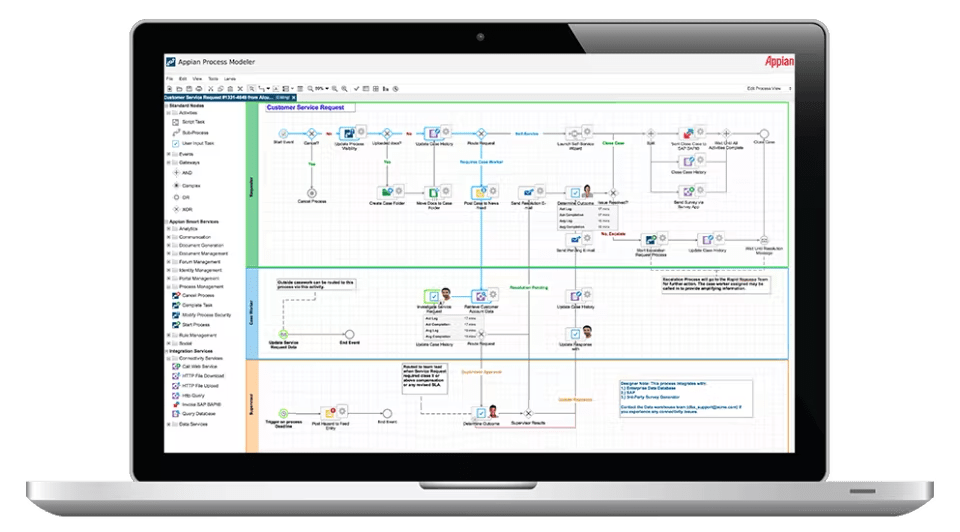
Appian is a software development platform that functions as full-stack automation and enterprise low-code to produce BPM tools. Appian is a great solution as a development environment for corporate software applications.
Although Appian is not a typical business process management solution, this app development platform is designed primarily for developers to automate business processes for peak performance management.
Key features
- Robotic process automation
- Intelligent document processing
- Visual workflow creation
- Dynamic reporting
- Continuous optimization
Pros
- Create processes quickly with drag-and-drop workflow builders
- Integrate data from cloud services, RDBMS, or legacy systems
- Access workflows and key processes from any location
- Low-code automation platform for process improvement
Limitations
- Limited customizations
- Coding knowledge necessary
- No way to assign comments to specific team members
Pricing
- Free
- Application: Contact for pricing
- Platform: Contact for pricing
- Unlimited: Contact for pricing
Customer ratings and reviews
- G2: 4.5 out of 5 (274+ reviews)
- Capterra: 4.2 out of 5 (72+ reviews)
6. Signavio
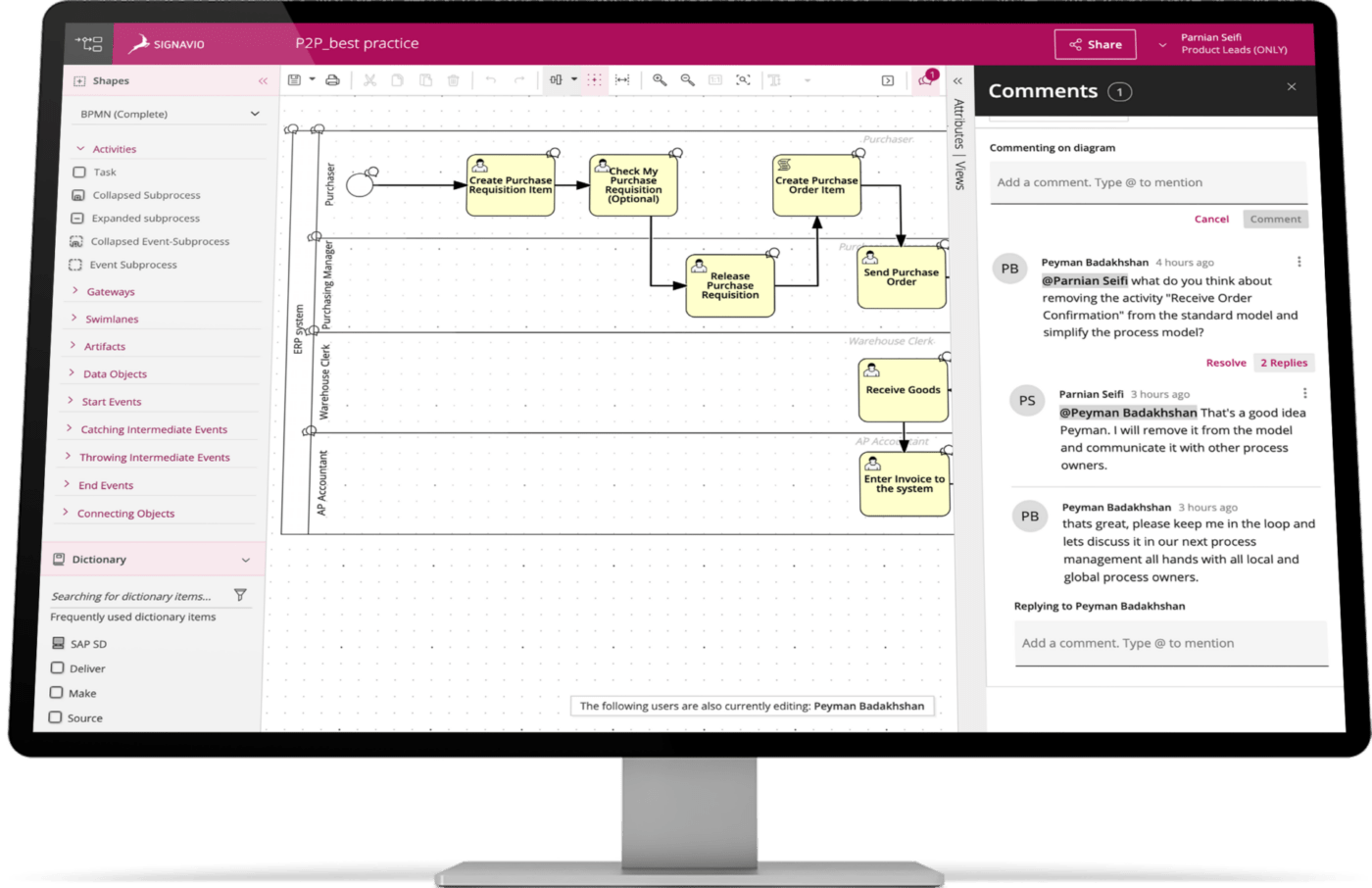
Signavio is a BPM solution that offers a variety of tools to transform and automate business processes. As a configurable and robust platform, Signavio can optimize business processes and deliver a rapid and thorough analysis.
Advanced drag-and-drop process modeling and process mining-driven performance monitoring makes Signavio a strong process improvement contender.
Key features
- Collaborative model processing
- Connects with existing SAP ERP application or SAP S/4HANA software
- Robotic process automation
- Pre-built automation tools
- Process collaboration hub
Pros
- Easy data mapping
- Professional reporting templates
- Simple connectivity integrations
Limitations
- No Workflow feature
- Limits of reporting functions
- Can’t accommodate complex business processes
Pricing
- 30-day free trial
- Request for a quote
Customer ratings and reviews
- G2: 4.5 out of 5 (16+ reviews)
- Capterra: 4.5 out of 5 (24+ reviews)
Get The Business Process Management Software That Does It All
If you’re after a solution to optimize your business processes and easily implement BPM, ClickUp has all the features and functionalities you can shake a stick at.
From workflow management and collaboration tools to automate key processes, ClickUp is your software partner for continuous business improvement.
Give ClickUp a try for free to see how it’ll drive your business efficiency through the roof!
Guest Writer:

John Allen is the Director of SEO at 8×8 with over 14 years of experience, and an extensive background in building and optimizing digital marketing programs across SEM, SEO, paid media, mobile, social, and email, with an eye for new customer acquisition and increasing revenue.


Questions? Comments? Visit our Help Center for support.